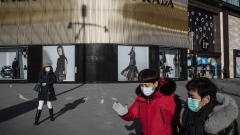May 15, 2020
Wealthy Travelers Are Starting To Book Year-End Vacations
, Bloomberg News
(Bloomberg) -- The new offering from Roar Africa is lavish, even for the safari outfitter’s well-heeled, often well-known clientele. With Roar Privé, they can experience an eight-day safari in South Africa without coming into contact with another human—except for their private pilots, guide, butler, chef, and whoMever they choose to bring along.
These very socially distant safaris start at $60,000 per person. Since early May, Roar has sold them to a half-dozen groups for the year-end “festive” season and beyond.
“I would never have thought to put it out there [during normal times],” says Roar chief executive Deborah Calmeyer, because of the additional cost of the trips. But these are not normal times and, in this moment, the appeal goes beyond exclusivity. “I’m so fearful for our wildlife and the people dependent on travelers coming back. Whatever we have to create to make it safe, that’s what we’re going to do.”
The coronavirus crisis has all but shut down travel around the world and across the board. The number of people going through U.S. Transportation Security Administration checkpoints has dropped by some 95% since the start of March. That month, private jet companies began turning away customers as international borders closed.
It’s still unclear when shuttered resorts, airports, and borders will reopen. But wealthy jetsetters are betting that by November or December, travel will be somewhat normal—and that spending additional dollars can keep them sufficiently safe.
“We had several weeks of crickets … not a single request,” says Brooke Lavery, co-owner of New York-based travel consultancy Local Foreigner. “Probably two weeks ago [in early May] is when it really started to come back.”
Some of the earliest requests are coming from clients who have the means to fly privately. Aside from being at reduced risk of infection, these travelers are also unaffected by flight cancellations or other airline disruptions. “At the drop of a hat, they could get themselves out if they needed it,” she explains. “They’re more free.”
Resorts that are set up to accommodate private aircraft, such as Petit Saint Vincent in Saint Vincent and the Grenadines, are likely to see a corresponding boost. Almost all of the 22 cottages on the 115-acre private island are booked for the year-end holidays.
In the U.S., the 12-cabin Dunton Hot Springs resort in Dolores, Colo., near Telluride, is sold-out for Christmas. In Aspen, Colo., the Little Nell’s director of sales, Mark Elias, reports: “We currently have twice the number of rooms confirmed for the holiday week, Dec. 24 to Jan. 2, as we did at the same time last year.”
Auberge Resorts, which has hotels in Los Cabos in Mexico’s Baja California and in Napa Valley, Calif., has seen a 50% year-over-year increase in holiday booking inquiries. And while summer requests for yacht charters have been down at Northrup & Johnson, marketing manager Janine St. Denis says the 2020 winter season is matching the 2019 pace.
That kind of optimism represents one of two dominant perspectives, according to travel agents. There are those eager to hit the road, despite the possibility of a second wave of Covid-19 infections in the fall. They’re maintaining existing reservations and planning new trips to make up for missed spring and summer travel, to ease the sense of being trapped at home or make sure they get exactly the destinations, hotels, and villas they want—especially if their bookings have flexible cancellation policies. (Whether the communities they intend to visit will embrace or reject the presence of outsiders is an open question.)
At the more cautious end, say agents, are clients who are refusing to travel until a coronavirus vaccine is available, or at least until things are more stable.
Some consumers may be caught between. There’s some urgency for those who have credits for canceled trips, says Melissa Biggs Bradley, founder and chief executive officer of luxury travel firm Indagare. “Many of those will expire by the end of the year,” she says. “There are not enough days or rooms to satisfy all the credit out—so if people don’t grab options, they may lose their credits.”
In any case, “luxury, high-end travel is going to be what comes back first,” says Kate Doty, managing director of premier access for adventure specialist GeoEx. Deep-pocketed travelers can afford to pay for space, privacy, and even coronavirus testing for staff.
City vs. Country
Whether they’re staying in the U.S. or venturing overseas, one thing is clear: Travelers are not booking urban breaks.
“I would say the common thread [among client requests] is spread out, wide-open spaces, privacy, and avoiding anywhere with density unless it’s brief,” says Brendan Drewniany, head of communications for luxury travel-planning firm Black Tomato.
Iceland is in demand, he says, because it’s remote but easy to reach, with direct flights from the U.S. and regularly scheduled transfers within the country. Private planes can fly into a dedicated terminal in Reykjavik, and many remote parts of Iceland are accessible by helicopter. “Deplar Farm has two helipads,” Drewniany says, referring to the 13-room heli-skiing and fly-fishing lodge on northern Iceland’s Troll Peninsula. It helps that the country is preparing to welcome international visitors in mid-June, with the provision that they test negative for Covid-19 upon arrival, quarantine for two weeks, or otherwise show a clean bill of health.
Auberge says it’s seeing spikes for its properties in Cabo, Hawaii, the Caribbean, and the mountains—places that are removed but not too remote for American guests.
The Maldives have rarely been more in demand, says George Morgan-Grenville, founder and CEO of U.K.-based travel design firm Red Savannah.
“This year, its geography leads it to be perceived as a safer area; each resort sits on its own island with its own controls with accommodation widely spaced,” he says. Deals that take as much as 35% off pricy overwater accommodations, such as the $2,600-a-night, waterslide-equipped villas at Soneva Jani, are putting the bucket list destination within reach for some. Unlike Iceland, however, the Maldives has no current plan to lift travel restrictions.
By contrast, one classic holiday trip is on the outs this year: skiing.
“Too many families picked up Covid-19 at European ski resorts,” says Indagare’s Bradley. Vail, Colo., emerged as a hotbed of infection for wealthy Mexicans, who then spread it back home. “And the news that there were many who caught it in Sun Valley [Idaho] has created a real fear of being in a ski destination this coming winter.”
By Land or by Sea
Instead, Bradley says her clients are asking about resort buyouts, wherein one guest or group books the whole property.
“Among the most popular buyout options are ranches or island locations,” she says, such as the Ranch at Rock Creek, a “luxury dude ranch” in western Montana, or the lodges at Ted Turner’s four New Mexico wilderness reserves.
They’re also interested in yacht charters. At the start of the global lockdown, one Indagare client hired a boat and had the crew quarantine for 14 days before the trip; the family plans to do the same thing over the holidays.
Villas are in high demand as well, says GeoEx’s Doty. Private homes may seem the safest way to release the pressure value on a pent-up, economically critical travel industry, especially in hard-hit countries such as Italy.
Andrea Grisdale, owner and CEO of Italy specialist IC Bellagio, says that there is such “huge interest” for the upcoming fall-winter season that she has, at times, struggled to find availability for her clients. For now, the European Union is recommending that travel remain limited to domestic and European guests, but Grisdale expects international visitors to return as soon as September.
Beyond solitude and privacy, such buy-outs have the added benefit of allowing space for extended families to come back together.
“We are seeing more multigenerational retreat requests,” Bradley says, with travelers optimistic that by December, social distancing recommendations will relax. “As many families have been forcibly separated, they are eager to gather over the holidays.”
For some, these holiday trips are becoming lavish, catch-all celebrations, a place to celebrate the missed birthdays, anniversaries, births, and other milestones a Zoom call couldn’t properly honor.
Mary Margaret Hanke, a six-time guest of high-end tour company Classic Journeys, has already booked her extended family of eight to visit Peru to celebrate the graduations of her daughter and niece. Though the country’s borders are still closed, and a curfew is in place, they are scheduled to leave at the beginning of August.
“The girls may not be able to walk across the stage with their diplomas,” says company founder Edward Piegza. “But they can walk the Inca Trail to Machu Picchu.”
©2020 Bloomberg L.P.


